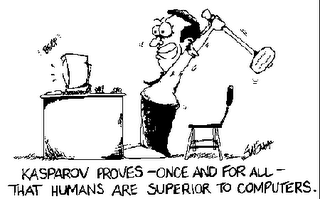How chess and mess define the meaning of life
Stephen Poole previews cultural studies titles in 2007
Saturday December 30, 2006
The Guardian
It's always nice to see one's pet theories confirmed by rigorous analysis, and a subject close to this writer's heart is encapsulated in the title of A Perfect Mess: The Hidden Benefits of Disorder, by Eric Abramson and David H Freedman (Weidenfeld, January). Looking at more than just my desk, the authors conclude that there is an ideal level of messiness that makes any system more robust and productive. The virtues of disorder are illustrated with examples from "business, parenting, cooking, the war on terrorism, retail and even the meteoric career of Arnold Schwarzenegger", and the authors promise that their insights can be applied on a society-wide scale as well as to your kitchen. I would say more on the subject, but I seem to have lost my notes somewhere in the piles of detritus towering around me.Apparently averse to mess, on the other hand, is Phil Spector, legendary record producer and - it says here, rather unkindly - "demented control freak". Are there well-balanced control freaks? Shouldn't a record producer actually want to be in control? Spector gave his first interview in 25 years to journalist Mick Brown in late 2002. Two months later, the producer was arrested after an actress was shot dead in his Los Angeles castle. Thus prompted, Brown has written Tearing Down the Wall of Sound (Bloomsbury, April), recording his own "personal odyssey" into the bizarre story of the man with the golden ears who gave the world such acoustic palaces as "Unchained Melody" and "River Deep, Mountain High". Spector's long-delayed murder trial finally begins in January.
Chess genius Garry Kasparov, whom no one would dare to call a "demented control freak" to his face, retired from competitive play in 2005, but has hardly been idle since, founding the Russian political party United Civil Front and continuing to write his history of chess, titled with no false modesty My Great Predecessors. Now, somewhat like a hirsute, modern Sun Tzu, he offers his general philosophy of strategy, How Life Imitates Chess (Heinemann, March). As he promised in a Wall Street Journal article last year, the book "examines the unique formulae people use in thinking and problem-solving. For example, the way hope and doubt affect how we process information, or the way we perform in a crisis. I hope it will also serve as a guide to improving these processes." Can the ability to calculate a 20-move forced tactical sequence in chess help you navigate the shark-infested waters of office politics? We shall see.
Competing in the sage stakes is Terry Eagleton, the fun-loving literary critic who has lately taken to offering public lessons in theology to Richard Dawkins, probably not much to the latter's enrichment. It will be interesting to see if this spat has any bearing on the content of Eagleton's new book, breezily entitled The Meaning of Life (Oxford, February). (No doubt it's only to me that this looks like a misprint for The Meaning of Liff.) Schopenhauer, Beckett and Shakespeare are wheeled on and off, and people are castigated for filling the void of meaning with Scientology or football. We are promised laughs along the way. "The meaning of life is a subject fit either for the crazed or the comic, and I hope I have fallen more into the latter camp than the former," Eagleton writes. I hope so too; I really do.
It may not be clear where Paul Virilio fits in Eagleton's curious schema of crazed or comic (to which there is no doubt more than mere alliteration), but the zestfully polemical French philosopher of speed no doubt hopes to ruffle a few complacent feathers with his Art As Far As the Eye Can See (Berg, July). Virilio loves to provoke with vast diagnoses. "The defining characteristic of mass culture today is cold panic," according to his new book's blurb. "The same panic which has used terrorism to derail democracy has hijacked the whole art enterprise. This panic is reliant on audio-visual technology to create a new all-seeing, panoptic politics. And the first casualty of this politics is the art of seeing ... In the 21st century, the new battleground is art as light versus art as matter." Is it true? What does it mean? It will be fun to find out.
More apparently traditional literary talk might be expected from Kevin Jackson's The Book of Hours (Duckworth, March), which includes such curious facts as that dinner used to be taken at 10am and has gradually slipped ever later, and explanations of Linnaeus's floral clock (which told the time using smell), or the system of bells on Royal Navy ships. In the hands of a lesser writer you might fear a merely twee temporal miscellany, but Jackson, author of the wonderful Invisible Forms (on the paratextual paraphernalia of books: indexes, acknowledgments, footnotes and so on), can be relied upon to make of it something fascinating. Meanwhile, a hush of anticipation should by rights attend the new book by Milan Kundera, whose The Curtain (Faber, March) is an essay on the novel. We each, he argues, have a preconceived notion of reality - "a magic curtain, woven of legends, hung before the world" - and the job of the novelist is to tear through it and reveal what lies on the other side. (A small wizard?) The maestro also promises to make more of translinguistic influence than is usually allowed in talk of "the English novel" or "the French novel". We are lucky to have a great novelist who is also a great critic.
· Steven Poole's Unspeak is published by Little, Brown






